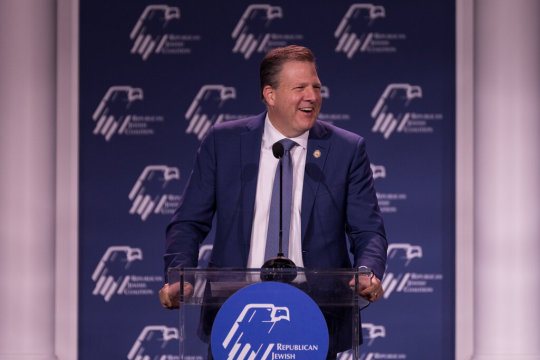#chris sununu
Text
Republicans are soft on disease control. We all remember the MAGA anti-vaccine hysteria when the COVID-19 vaccines became available.
They are now turning their attention to the polio vaccine which was approved for use in the US on 12 April 1955. The number of polio cases in the US dropped from 57,879 in 1952 to 910 in 1962 and became rare by the early 1970s.
Thanks to anti-vaxxing conspiracy crackpots, polio returned to the US for the first time in three decades in 2022.
New Hampshire Republicans want to weaken vaccination requirements to kowtow to anti-science elements in their state.
New Hampshire could soon beat Florida—known for its anti-vaccine Surgeon General—when it comes to loosening vaccine requirements. A first-in-the-nation bill that’s already passed New Hampshire’s state House, sponsored only by Republican legislators, would end the requirement for parents enrolling kids in childcare to provide documentation of polio and measles vaccination. New Hampshire would be the only state in the US to have such a law, although many states allow religious exemptions to vaccine requirements.
Currently, Republicans control New Hampshire’s state House, Senate and governor’s office—but that isn’t a guarantee that the bill will be signed into law, with GOP Gov. Chris Sununu seemingly flip-flopping when it comes to disease control. Sununu did sign a bill in 2021 allowing people to use public places and services even if they did not receive the Covid-19 vaccine. But the next year, the governor vetoed a bill that would bar schools from implementing mask mandates.
The polio vaccine, first offered in 1955, and the MMR shot, which treats the highly infectious measles, mumps, and rubella viruses, are two very crucial vaccines both in the US and internationally. Since the year 2000 alone, vaccines against measles are estimated to have saved over 55 million lives around the world.
[ ... ]
Vaccine hesitancy is rising among parents of young children. A 2023 survey from the Pew Research Center found that around half of parents with kids four or younger thought that not all standard childhood vaccines—a list that also includes hepatitis B, rotavirus, DTaP and chickenpox—may be necessary. Anti-vaccine misinformation plays a role in this phenomenon, which began before the Covid-19 pandemic, but has certainly increased since. In a 2019 UK report, about 50 percent of parents of young kids encountered false information about vaccines on social media.
Gov. Chris Sununu is a spineless putz. In some ways he's like Lindsey Graham who likes to send smoke signals of independent thinking but always comes crawling home to Daddy Donald.
Sununu campaigned for Nikki Haley and blamed Trump for January 6th. But that hasn't stopped him from endorsing Trump anyway. Instigating a coup d'état does not disqualify somebody from the presidency in Sununu's opinion.
GOP's Chris Sununu tries, fails to defend his Trump endorsement
Sununu may do for polio in New Hampshire what Trump did for COVID in the entire US in 2020.
#new hampshire#polio#polio vaccine#poliomyelitis#anti-vaxxers#vaccine hesitancy#chris sununu#flip-flopper#republicans#contagious diseases#vaccine disinformation#public health#vaccination requirements#pandemics#measles#mmr#covid-19#donald trump#election 2024#vote blue no matter who
9 notes
·
View notes
Text
New Hampshire Governor DILFs (Vol. 3)







#John Lynch#John H. Sununu#Judd Gregg#Hugh Gallen#Meldrim Thompson Jr.#Steve Merrill#Chris Sununu#GovernorDILFs
12 notes
·
View notes
Text
Ben Blanchet at HuffPost:
New Hampshire Gov. Chris Sununu, who was recently a staunch critic of Donald Trump, changed his tune on the former president as he backed his 2024 campaign in an interview with ABC News’ George Stephanopoulos on Sunday.
“No other president in American history has contributed to an insurrection so please explain, given the fact that you believe he contributed to an insurrection, how you can say we should have him back in the Oval Office,” Stephanopoulos asked on ABC News’ “This Week.”
“Because for me it’s not about him as much as it is having a Republican administration,” said Sununu, who predicted that Trump wouldn’t be the 2024 GOP presidential nominee but didn’t rule out voting for him.
The GOP governor, who described himself as a “Trump guy through and through” in 2019, has repeatedly bashed the former president following the Jan. 6, 2021, attack.
He’s referred to Trump as “crazy,” “not a real Republican,” “worried about jail time,” called on GOP candidates to break free from Trump’s “drama” and described his indictment over his handling of classified documents as “self-inflicted.”
“You said in the past that he should drop out if he’s convicted in the classified documents case. Do you still believe that?” asked Stephanopoulos after Sununu attempted to dodge his question.
“Drop out after being the nominee? Of course not. That’s not to be expected at all,” Sununu answered.
Stephanopoulos later offered a summary of Sununu’s takes.
“You support him for president even if he’s convicted for classified documents. You support him for president even though you believe he contributed to an insurrection. You support him for president even though you believe he’s lying about the last election. You support him for president even if he’s convicted in the Manhattan case. I just want to say the answer to that is, ‘Yes, correct,’” he asked.
“Yeah, me and 51% of America,” answered Sununu despite recent general election poll numbers that say otherwise.
Appearing on ABC's This Week Sunday, host George Stephanopoulos shredded New Hampshire Gov. Chris Sununu (R)'s turn from Trump critic to Trump supporter.
From the 04.15.2024 edition of ABC's This Week:
youtube
#George Stephanopoulos#Chris Sununu#Flip Flopping#Donald Trump#ABC News#ABC#This Week#2024 Presidential Election#2024 Elections
7 notes
·
View notes
Text
Live Republican or die.

December 25, 2023
In its landmark 2019 decision in Rucho v. Common Cause, the US Supreme Court ruled 5-4 (with the usual Federalist Society hacks in the majority) that federal courts have no jurisdiction to decide whether a state's election maps are designed to give one party an illegal advantage. But not to worry, wrote Chief Justice John Roberts, this does not "condemn complaints about districting to echo into a void,” because we can depend on the states “actively addressing the issue.” Sure we can. Let's see how the state of New Hampshire is addressing it.
Throughout the 19th and 20th centuries, New Hampshire voters elected mostly Republicans. But this changed in 1992 when they started voting for Democrats. Since then, the state has swung back and forth and is nowadays considered a purple swing state. At present, its two congressional representatives and both US senators are Democrats. However, New Hampshire's current governor (Chris Sununu), attorney general and secretary of state are all Republicans. The GOP also won control of the state legislature in 2020. And here's where the problem begins.
Upon gaining dominance over the state government following the decennial census, New Hampshire Republicans proceeded to cement their advantage by gerrymandering legislative districts to create more Republican-leaning seats. It should also be noted Sununu previously vetoed two bipartisan bills that would have created an independent commission to redraw the maps.
As a result, The New Hampshire Center for Public Interest Journalism, reporting on the 2022 state House and Senate races, concluded: "Democratic candidates received more [total] votes than their Republican counterparts, but will still be in the minority."
A lawsuit was duly launched and appealed to the New Hampshire Supreme Court, which includes three Sununu-appointed justices. And last December, the court ruled 3-2 (with the governor's trio forming the majority) to leave in place the GOP gerrymanders signed into law by Sununu. Which likely locks in the Party’s structural advantage in New Hampshire through the 2030s.
The court said the plaintiffs should get state lawmakers to pass redistricting reform. But that's never going to happen since the New Hampshire legislature is already gerrymandered. It's a circular dynamic that leaves New Hampshire voters with no recourse, given that the state's high court decided it couldn’t intervene. And, by the way, the New Hampshire Supreme Court issued a ruling in 1999 barring statewide referendum initiatives, too.
Says UNH law professor John Greabe, “The courthouse doors are shut. Both the federal courthouse doors and the state courthouse doors now.” Meanwhile, democracy in the red-ruled states continues to perish.
2 notes
·
View notes
Link
Bill Scher divides the possible 2024 and later candidates into several tiers
The winners who improved their chances during 2022 (Biden and DeSantis)
The loser who lost ground in 2022 (Trump)
The third wheel (Pence)
Other Republicans who broke with Trump
Republican senators (Cruz, Rubio, and T. Scott)
Purple state Republican governors (Kemp and Youngkin)
The vexed vice (Harris)
The second-guesser (Sanders)
The pilot project (Buttigieg)
The Democratic bench
#ron desantis#joe biden#donald trump#mike pence#john bolton#liz cheney#chris christie#chris sununu#nikki haley#larry hogan#asa hutchinson#kristi noem#mike pompeo#ted cruz#marco rubio#tim scott#brian kemp#glenn youngkin#kamala harris#bernie sanders#pete buttigieg#cory booker#roy cooper#mark kelly#ro khanna#amy klobuchar#phil murphy#jared polis#j. b. pritzker#raphael warnock
11 notes
·
View notes
Text
“I’m a principled free-market conservative. For others out there that think that the government should be penalizing your business because they disagree with you politically, that isn’t very conservative.”
-- Gov. Chris Sununu (R-NH)
Yet another formerly deeply held belief that's being tossed the wayside to appease the cultural grievances of Trumpism.
#politics#us politics#trumpism#maga#chris sununu#ron desantis#free market#free market economics#government control#cnn
0 notes
Text
Sununu on Trump: ‘He’s Not Scaring Anyone Out of the Race’ - The New York Times
Sununu on Trump: ‘He’s Not Scaring Anyone Out of the Race’ – The New York Times
You’re reading the On Politics newsletter, for Times subscribers only. A Times reader’s guide to the political news in Washington and across the nation. Confident and even brash, Chris Sununu is one of the most popular governors in America. In a year when many Republicans struggled, he was re-elected in New Hampshire by more than 15 percentage points. The way to win, he says, is not “Ranting and…

View On WordPress
#Chris Sununu#Donald Trump#election#Elections#governors#Governors (US)#internal-sub-only-nl#midterm elections#Midterm Elections (2022)#New Hampshire#Politics#Politics and Government#Presidential Election of 2024#Republican Party#republicans#Sununu#Christopher T (1974- )#Trump#Donald J#United States#United States Politics and Government#US#US Politics
0 notes
Text
The Zionist Organization of America thanks and commends New Hampshire Gov. Chris Sununu for issuing an executive order this week that makes his state the 37th U.S. state to officially combat the anti-Jewish and anti-Israel BDS (boycott, divestment and sanctions) Movement.
Sununu’s executive order notes:
“Notwithstanding any other provision of law, no executive branch agency may adopt any investment policy that would have the effect of requiring or inducing any person to boycott Israel.
“Executive branch entities will be restricted from investing in companies found to be engaged in a boycott of Israel.
“No executive branch agency shall contract with a company that has been determined to be boycotting Israel.” And:
“Any executive branch agency that enters a contract shall make the contracting party aware that the agency will not tolerate any boycotting of Israel.”
ZOA National President Morton A. Klein said in a statement: “We are grateful that Gov. Sununu took this important action. We encourage America’s remaining governors to follow suit. However: While executive orders are very helpful as long as they remain in existence, a subsequent governor can vacate them. This is why it is vitally important that America’s state legislatures also must introduce and pass legislation that prohibits anti-Israel boycotts, divestments and sanctions. BDS is merely a thinly veiled form of Jew-hatred.”
Klein added: “We urge all Americans who are supportive of Israel and who oppose Jew-hatred to reach out to their governors and state lawmakers to encourage them to issue anti-BDS executive orders and to introduce and pass anti-BDS laws.”
Gov. Sununu noted in a tweet that “NH & Israel have experienced decades of successful exchange of commerce, culture, technology, & tourism. NH will not tolerate anti-semitism, & we are taking significant steps at the state level to prohibit discriminatory boycotts of Israel in state procurement and investments.”
12 notes
·
View notes
Text
Last year, after Disney had the temerity to issue a statement opposing one of his prized legislative initiatives, Ron DeSantis punished the company by removing its self-governing status. (DeSantis justified the maneuver as a removal of unjustified privileges, but he had not previously opposed Disney’s status and made little attempt to disguise its nakedly retaliatory nature).
On Monday, he took matters much further. DeSantis appointed a board to oversee Disney. The Central Florida Tourism Oversight District is stacked with DeSantis cronies, including Bridget Ziegler, a proponent of his education policies; Ron Peri, who heads the Christian ministry the Gathering USA; and Michael Sasso, president of the Federalist Society’s Orlando chapter.
While the board handles infrastructure and maintenance, DeSantis boasted that it could use its leverage to force Disney to stop “trying to inject woke ideology” on children.
“When you lose your way, you’ve got to have people that are going to tell you the truth,” DeSantis proclaimed. “So we hope they can get back on. But I think all of these board members very much would like to see the type of entertainment that all families can appreciate.”
It is worth pausing a moment to grasp the full breadth of what is going on here. First, DeSantis established the principle that he can and will use the power of the state to punish private firms that exercise their First Amendment right to criticize his positions. Now he is promising to continue exerting state power to pressure the firm to produce content that comports with his own ideological agenda.
Whether he is successful remains to be seen. But a few things ought to be clear. First, DeSantis’s treatment of Disney is not a one-off but a centerpiece of his legacy in Florida. He has repeatedly invoked the episode in his speeches, and his allies have held it up as evidence of his strength and dominance. The Murdoch media empire, which is functionally an arm of the DeSantis campaign, highlighted the Disney conquest in a New York Post front page and a Fox & Friends segment and DeSantis touted his move in a Wall Street Journal op-ed.
Second, DeSantis’s authoritarian methods have met with vanishingly little resistance within his party. The only detectable Republican pushback has come from New Hampshire Governor Chris Sununu, who warned, “Look, Ron’s a very good Governor. But I’m just trying to remind folks what we are at our core. And if we’re trying to beat the Democrats at being big-government authoritarians, remember what’s going to happen. Eventually, they’ll have power … and then they’ll start penalizing conservative businesses and conservative nonprofits and conservative ideas.” (Of course, this warning holds only if Republicans believe they will have to relinquish power. If DeSantis can truly follow the example of Viktor Orbán, losing power becomes only a theoretical risk.)
And third, DeSantis has been very explicit about his belief that he sees his methods in Florida as a blueprint for a national agenda. So there is every reason to believe that, if elected president, DeSantis would use government power to force both public and private institutions to toe his line. Speaking out against him, or even producing content he disapproves of, would become a financially risky proposition.
Part of what makes DeSantis so dangerous is that Donald Trump created a very defined idea of authoritarianism in the minds of his critics. His refusal to accept the 2020 presidential-election results was indeed a dangerous attack on democratic legitimacy — but this especially notorious episode has overshadowed his other efforts to abuse state power. Trump wielded federal regulations to punish the owners of the Washington Post and CNN for coverage he disapproved of and used diplomatic leverage to extort Ukraine into smearing his political rival. Republicans either supported or ignored these abuses of power.
To whatever extent they have principled objections to authoritarianism, those objections are limited almost entirely to fomenting a violent mob to overturn an election. And while inciting an insurrection is extremely dangerous, it hardly exhausts the scope of illiberal tools available to a sufficiently ruthless executive.
Damon Linker recently criticized liberals for unfairly calling DeSantis as bad as Trump. Linker’s prediction that a second Trump administration would be more dangerous than a first DeSantis administration might be correct. But it’s hard for me to understand how he can state this so confidently when he acknowledges DeSantis’s illiberal intentions and lack of democratic scruples. Comparing the relative evils of two authoritarian-minded leaders seems to be mainly an exercise in guesswork.
A year ago, I wrote a long profile of DeSantis, in which his deep-rooted distrust of liberal democracy was a major theme. Last fall, I attended the National Conservatism Conference, where the attendees laid out rather plainly their ambition to turn DeSantis into a model for a ruthless, illiberal party that would use the organs of the state to crush its enemies. Since those pieces appeared, DeSantis’s actions have made me more, not less, concerned.
Whether DeSantis would actually do more damage to American democracy in office than Trump could remains hard to say. Perhaps, perhaps not. But we should recognize that he is not putting himself forward as a critic of Trump’s authoritarianism. He is promising, on the contrary, to exceed it.
#us politics#news#intelligencer#2023#gov. ron desantis#florida#Disney#reedy creek improvement district#Central Florida Tourism Oversight District#Bridget Ziegler#Ron Peri#Gathering USA#Michael Sasso#federalist society#First Amendment#1st amendment#freedom of press#freedom of speech#free speech#gov. Chris Sununu#Damon Linker#authoritarianism#fascism#gop#conservatives#republicans#gop platform#gop policy
16 notes
·
View notes
Text
Governor Who-Knew Sununu?
Yesterday I saw a video clip of an interview with George Stephanopoulos interviewing New Hampshire Governor Chris Sununu. Stephanopoulos did his level best to stick to the facts, to ask straightforward questions, but Sununu had one point and only one point that he wanted to make. Frankly, Governor Sununu came out looking like a complete braying arse by the end of the day.
The reason I’m posting…
youtube
View On WordPress
0 notes
Text
Cannabis legalization bill passes N.H. House, but lacks governor’s support
A marijuana legalization bill that passed the New Hampshire House on Thursday, after months of workshopping and debate, lacks the support it would need from Governor Chris Sununu to become law.
A spokesperson for Sununu said the governor has clearly articulated the policy framework necessary to win his signature, but the version of House Bill 1633 that state representatives approved on Thursday…

View On WordPress
#Governor Chris Sununu#Legal Marijuana#marijuana legalization#massachusetts marijuana#recreational marijuana
0 notes
Link
From the March 10, 2023 report:
As DeSantis heads to Iowa Friday for what’s effectively the start of his presidential bid, his initial strength with Republican contributors and voters alike is prompting the other would-be candidates to divide or at least pair their attacks. With Trump appearing to have an unshakable core of support, and the nature of the primary shaping up to be who can emerge as the strongest alternative to him, the rest of the potential field plainly feels pressure to dislodge DeSantis from his early perch as that candidate.
...
While DeSantis is building the message and team of messengers to guard his right MAGA flank from Trump, though, much of the rest of the field is taking aim with hopes of raising doubts about him among non-MAGA voters.
...
While he said he’s not likely to endorse DeSantis, [former Freedom Caucus lawmaker Mick] Mulvaney urged the other Republicans to keep their fire on the former president. “In order to beat Trump you have to beat Trump,” he said.
5 notes
·
View notes
Text
Can the Center Hold?
Hurrah! It’s the fabulous Julie Mason, Texan bred, once a proud journalist at the Houston Chronicle, now working with POTUS, and with Sirius XM Radio. Line up: Kay Bailey Hutchison, former Housing and Urban Development Secretary Henry Cisneros, John H. Sununu, a former Governor of New Hampshire and White House chief of staff, U.S. Sen Evan Bayh.
The crisis in Washington: no leadership, adrift…

View On WordPress
#Evan Bayh#Governor Chris Sununu#Henry Cisneros#Julie Mason#Kay Bailey Hutchison#Texas Tribune Festival#TribFest15
0 notes
Text
"For the first time in almost 60 years, a state has formally overturned a so-called “right to work” law, clearing the way for workers to organize new union locals, collectively bargain, and make their voices heard at election time.
This week, Michigan finalized the process of eliminating a decade-old “right to work” law, which began with the shift in control of the state legislature from anti-union Republicans to pro-union Democrats following the 2022 election. “This moment has been decades in the making,” declared Michigan AFL-CIO President Ron Bieber. “By standing up and taking their power back, at the ballot box and in the workplace, workers have made it clear Michigan is and always will be the beating heart of the modern American labor movement.”
[Note: The article doesn't actually explain it, so anyway, "right to work" laws are powerful and deceptively named pieces of anti-union legislation. What right to work laws do is ban "union shops," or companies where every worker that benefits from a union is required to pay dues to the union. Right-to-work laws really undermine the leverage and especially the funding of unions, by letting non-union members receive most of the benefits of a union without helping sustain them. Sources: x, x, x, x]
In addition to formally scrapping the anti-labor law on Tuesday [February 13, 2024], Michigan also restored prevailing-wage protections for construction workers, expanded collective bargaining rights for public school employees, and restored organizing rights for graduate student research assistants at the state’s public colleges and universities. But even amid all of these wins for labor, it was the overturning of the “right to work” law that caught the attention of unions nationwide...
Now, the tide has begun to turn—beginning in a state with a rich labor history. And that’s got the attention of union activists and working-class people nationwide...
At a time when the labor movement is showing renewed vigor—and notching a string of high-profile victories, including last year’s successful strike by the United Auto Workers union against the Big Three carmakers, the historic UPS contract victory by the Teamsters, the SAG-AFTRA strike win in a struggle over abuses of AI technology in particular and the future of work in general, and the explosion of grassroots union organizing at workplaces across the country—the overturning of Michigan’s “right to work” law and the implementation of a sweeping pro-union agenda provides tangible evidence of how much has changed in recent years for workers and their unions...
By the mid-2010s, 27 states had “right to work” laws on the books.
But then, as a new generation of workers embraced “Fight for 15” organizing to raise wages, and campaigns to sign up workers at Starbucks and Amazon began to take off, the corporate-sponsored crusade to enact “right to work” measures stalled. New Hampshire’s legislature blocked a proposed “right to work” law in 2017 (and again in 2021), despite the fact that the measure was promoted by Republican Governor Chris Sununu. And in 2018, Missouri voters rejected a “right to work” referendum by a 67-33 margin.
Preventing anti-union legislation from being enacted and implemented is one thing, however. Actually overturning an existing law is something else altogether.
But that’s what happened in Michigan after 2022 voting saw the reelection of Governor Gretchen Whitmer, a labor ally, and—thanks to the overturning of gerrymandered legislative district maps that had favored the GOP—the election of Democratic majorities in the state House and state Senate. For the first time in four decades, the Democrats controlled all the major levers of power in Michigan, and they used them to implement a sweeping pro-labor agenda. That was a significant shift for Michigan, to be sure. But it was also an indication of what could be done in other states across the Great Lakes region, and nationwide.
“Michigan Democrats took full control of the state government for the first time in 40 years. They used that power to repeal the state’s ‘right to work’ law,” explained a delighted former US secretary of labor Robert Reich, who added, “This is why we have to show up for our state and local elections.”"
-via The Nation, February 16, 2024
#michigan#united states#us politics#labor#labor rights#labor unions#capitalism#unions#unionize#gretchen whitmer#democrats#voting matters#right to work#pro union#workers#workers rights#good news#hope
1K notes
·
View notes